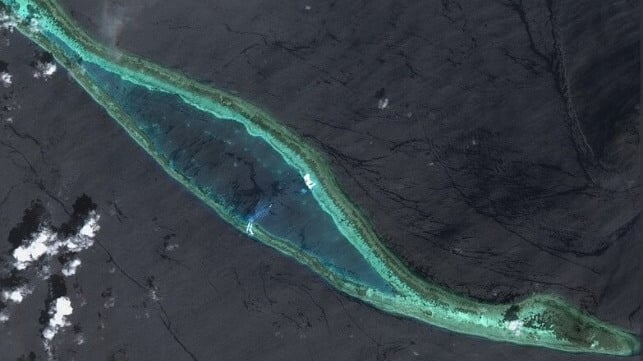Vietnam Puts Strategic Airfield on Newly-Built Island in the Spratlys

Vietnam is building a new airstrip on newly-reclaimed land in its segment of the Spratly Islands, capping off a large-scale campaign of island-building that began in 2021.
According to Radio Free Asia, Vietnam added more than 600 acres of dry land to its holdings in the Spratly Islands over the last year alone, using a combination of shore-based dredging equipment and cutter suction dredgers. The largest amount of activity was on Barque Canada Island: it is nearly three miles long now, and has enough space to develop a strategic airstrip of military value (3,000-plus meters). The airstrip in progress is currently about 1,000 meters long and growing.
The Asia Maritime Transparency Institute (AMTI) predicted that Vietnam would install an airstrip on the island earlier this year, and suggested that it would help the Vietnamese military expand the reach of its maritime patrols.
According to RFA, Vietnamese sources expect that their government will add at least one more new airstrip in the area, and perhaps several. Barque Canada Reef is at the southern end of the archipelago, south and west of most of China's largest military installations. Vietnam also occupies islands to the north of Mischief Reef and Fiery Cross Reef, where China maintains naval harbors and large strategic airstrips, and the Vietnamese military could potentially straddle China's positions with new base infrastructure on either side.
Beijing's South China Sea Probing Initiative claims that the Vietnamese effort could eventually eclipse Beijing's massive military infrastructure program in the region. So far, however, China's response has been muted - unlike its confrontational and contentious relationship with Manila, which has an EEZ claim over the archipelago but no island-building programs.

that matters most
Get the latest maritime news delivered to your inbox daily.
The Philippines and Vietnam have moved to settle their maritime claim differences in the South China Sea, and have pledged to abide by the outcome of an international arbitration process. However, Vietnam is on track to have the upper hand in the area, according to Chen Xiangmiao of the pro-China National Institute for South China Sea Studies.
"With recent upgrades to its port facilities, Vietnam is poised to maintain a continuous maritime law enforcement presence, which will significantly strengthen its control over the entire Spratly region," Chen told the South China Morning Post. "These maneuvers could lead to an escalation in maritime interactions and competition between China and Vietnam, raising significant concerns for Chinese authorities."
